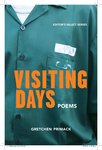

Hardly anyone who doesn’t live or work in one understands the world of prisons, and even the people who do live or work there sometimes struggle with it. Pop culture plays the idea for laughs or chills. Politicians play the issues around it for votes. A lot of people whose knowledge comes only third- or fourth-hand tend to have strong opinions about what prison life is like, what it should be like, and about its inhabitants, and these opinions are often seasoned with half-understood emotion. The idea of “the Big House where the Bad Guys go” triggers everything from semi-conscious guilt to righteous outrage to smug superiority.
Now along comes poet and teacher Gretchen Primack with “Visiting Days,” a book that blows a gaping hole through that hard, high, sharp wall of misunderstanding and concertina wire and lets in a massive blast of natural light. Primack has taught in prison and organized education programs there for over two decades, and like any true educator, she’s clearly learned as much from her students and their challenging surroundings as they have from her.
The collected poems probe prison in all of its many moving parts, with unflinching empathy all the more powerful for its objectivity, untainted by condescension or romance. Many are first- person narration in which Primack slips behind a prisoner’s eyes and into his chest and takes us with her; these particular people are fictional creations, but they live and breathe on the page, and first readers from behind the walls have praised her accuracy. She doesn’t flinch from the grim realities, the violence and bureaucratic insanity and anguish, without pontificating or judging. The view is up close, personal and graphic.
The language is stunning. This is Primack’s third book of poetry, and she just keeps getting better. She weaves together realism and magical realism, irony and bitterness, concrete and steel and blood and sings it to us in brutally simple, flowing, lyrical language that engages brain and heart. “Visiting Days” ought to be required reading for anyone whose life touches prison in any capacity at all, and certainly for anyone who presumes to hold an informed opinion on it.
Creative arts programming is one of the tactics that’s most effective in reducing violence on the inside and building resilience for afterward. People who cannot reveal their inner workings to a counselor who’s consciously seeking to change their behavior can often, when given the chance to do serious art work that gets them in the gut, begin to find the reasons why they might want to change for themselves; Rehabilitation Through the Arts and the Bard Prison Initiative have the proof.
Yet a stereotype persists in some circles that the volunteers who go behind the walls to teach are naive, “do-gooders” or even “thug-huggers” whose misguided efforts do nothing at best, pose a security risk at worst.
“Visiting Days” flash-fries that entire notion into dust. One cannot read these poems and devalue the human connection that birthed them, and the reasons why imprisoned people need to learn and write and act and paint are made obvious many times over – shown, not told, as only a truly slammin’ poet can do, in a style so natural to the ear that you barely notice it until your heart leaps out of your body.
The book is available starting March 1 on gretchenprimack.com. Primack will read from her work at the Woodstock Community Center on April 13 at 5 p.m.